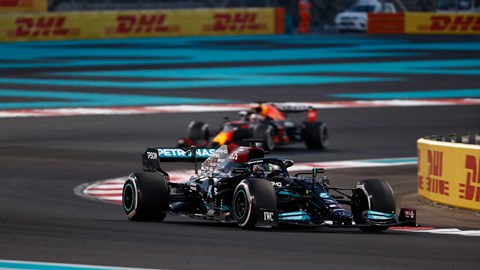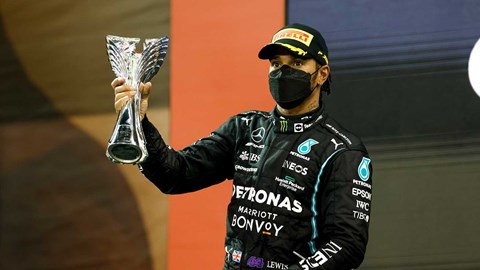► 2021 was an unforgettable season
► But not for all the right reasons
► Our online editor rants for a bit
2022 is set to be another exciting year for the F1, with new rules, new driver pairings and even new wheels. But for myself and many others, the perennial pre-season excitement that’s bubbled up since 1995-ish just isn’t materializing this time.
The Abu Dhabi GP – which saw the 2021 championship decided rather oddly on the last lap – has a lot to do with it, but really Yas Marina was just the final flourish in a season riddled with inconsistencies and accusations. Whether it was for entertainment or a simple mistake, the overall effect has been exhausting and demoralizing for the majority of F1 fans. Highlights have been avoided, the usual podcasts have been skipped – and even the F1 2021 game is on the shelf.

Let’s go back, a bit
In many ways, Formula One stood at an open goal going into the Abu Dhabi 2021 weekend. Somehow, through a season of strange steward rulings, steward inaction and actual racing, both championship challengers went into the race level on points.
For Netflix and the fanbase F1 is currently courting with its Sprint races, NFTs and Instagram Reels, this was manna from heaven. After the most competitive season in years, it all went to next goal wins; a situation the sport hadn’t seen in decades. A huge number of viewers on Sky and terrestrial TV tuned in for what should’ve been a straightforward showdown: F1 finally had a fair, close fight to the end.
After two years of total domination, Hamilton had a new challenger in the always fast, usually risky Verstappen. Whatever happened, we’d have a new record for what is statistically F1’s greatest driver of all time, or a new winner with an exciting future ahead.
Only the decisions taken by race control meant we got none of those things. Rather than an 8th title for Hamilton, or a well fought first title for Verstappen, after 58 laps of Abu Dhabi, we had a farce.
It’s left many F1 fans switching off and reminded others why they switched off in the first place. Remember that open goal? Somehow, through a process and chain of decisions we’ll probably never know, F1 managed to hit the crossbar and give itself a bloody nose.
Dealing with the mess
As the ‘F1 person’ in most of my friendship groups, I was the person that got many of the messages that followed immediately the race. New viewers were totally bewildered at the optics of what happened, while more seasoned fans immediately realised the unusual nature of what took place.
In the hours that followed information seeped out, and it just got worse. Was the safety car at full throttle? Were the rules followed? If it was any consolation to the fans, most of the drivers were equally confused.
The fallout was strong and expected: Mercedes lodged an appeal, pulled out of FIA events, and both Hamilton and Toto Wolff disappeared from public view. Later, the appeal was dropped, and Mercedes are already looking ahead to 2022; a year which they’ll be doing everything they can to crush the competition.
What’s next?
Essentially, as many tweets from many figures in the paddock will say, it’s unfortunate but over – and the show must go on. As a fan of the sport for around two decades now, it reminded me F1 has a bad habit of continuing as usual without any self-reflection. After all, this is the sport that brought you the 2005 US GP in which only six Bridgestone-shod cars took part, the unexpected 2021 Jeddah edition of ‘Deal or no Deal’ and of course, the 2021 Belgian GP that never was.
It’s this ability to move on from Abu Dhabi, as well as the decisions taken that day, that have currently created such a disconnect between the fans and the sport they love. For many, the sense of injustice and the loss of fair play is still there – regardless of the other 2021 highlights.

For fans with diverse backgrounds, the events of Abu Dhabi maybe even harder to overcome. On the surface it was a sporting error, but it also played on themes experienced by many from ethnic backgrounds. Here was someone they’d identified with and invested in, losing what he’d earned without any fault of his own. On track, Abu Dhabi was a slow safety car and some lapped cars, but off track it triggered a feeling of injustice that can be all too familiar for some groups.
Worse still, the ability to move on, to deal with it and ‘win it again next year’ is the equally familiar B-side to those feelings. After all, the idea of acceptance is intertwined with keeping the status-quo, and removing accountability – one of the reasons why there was so much support behind the Mercedes appeal. And returning to F1, there’s no guarantee Hamilton will be competitive next season either. 2022 will be a year of sweeping regulation changes – and even with an angry Brixworth and Brackley behind him, nothing is certain.
What now?
Pre-season testing will take place in February, and hopefully the new cars will stir some interest into many fans who feel slightly disillusioned now.
In many ways it’s because of a realisation that F1 hasn’t changed much after all. Back in the 90s, and 00s F1 seemed to constantly trip over itself. Last year with activism and positive messages off the track and (mostly) great racing on it, the sport seemed to be turning a corner. Alas, it’s lost its way once again.
It’s likely the off-track decisions made throughout the season were primarily for entertainment, and not designed to favour one driver or the other. However, the inconsistency required to build the anticipation has resulted in a more divided, suspicious fanbase than ever before. Throw in social media, and I can’t think of a time the sport hasn’t been more visibly fractured, or toxic.
A total rehaul of the rules and a more transparent rulebook must be on the agenda for 2022, but the most recent wording of the FIA’s communication on the matter doesn’t feel me with confidence. Hopefully the new cars, analysis and pictures from pre-season testing will jump start my enthiusiasm.
Can we just have proper, fair motor racing in 2022 please?